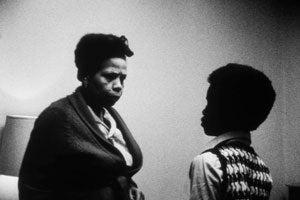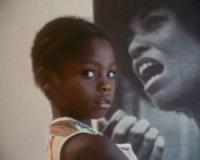“She was a large woman with a large purse that had everything in it but hammer and nails. It had a long strap, and she carried it slung across her shoulder. It was about eleven o’clock at night, and she was walking alone, when a boy ran up behind her and tried to snatch her purse.” (Excerpt from “Thank You, Ma’am,” by Langston Hughes)
Most movies are designed primarily to amuse and entertain. Billy Woodberry’s black and white, 13-minute film, The Pocketbook, starring Ella “Simi” Nelson and Ray Cherry, made me also feel and think. Adapted from Langston Hughes’ short story, “Thank You, Ma’am,” it’s the tale of a Black woman and her late night encounter with a young purse thief on her way home from work. It affected me in such a profound and emotional way that I wanted to look deeper into the role of the Black Matriarch.
According to Patricia Hill Collins’ book, Black Feminist Thought: Knowledge, Consciousness, and the Politics of Empowerment, “While the mammy typifies the Black mother figure in white homes, the matriarch symbolizes the mother figure in Black homes.” Both of these images have been around since slavery and have exemplified the Black American family structure for decades. They are also both stereotypes, which serve to devalue Black women. In The Pocketbook, after struggling with the young thief, the woman eventually overpowers the youngster, grabs him by his collar and drags him away. What is interesting about the depiction of the woman in Woodberry’s film is that she knows how to “naturally” mother this child who is not her own, a common trait of the stereotype which depicts the Black mother as someone who has to be a traditional good mother: nurturing and caring towards children, but at the same time she has to be unfeminine, strong willed and domineering. This matriarch stereotype is one of the main pictures white Americans have in their heads about Black women.

Featuring music by Leadbelly, Thelonious Monk and Miles Davis, The Pocketbook takes a surprising turn when the woman brings the boy to her home (where she lives alone) and instead of handing him over to the police or punishing his behavior, she feeds and talks with him. She tells him of how hard she has to work at her job to earn her keep in this world and that he should not have tried to steal her pocketbook. The ability of the Black woman to perform long, hard work, live independently of a man and maintain a family is a stark contrast to popular notions of womanhood: fragile, dependent, womanly, and white. The Black woman is thought to be physically, mentally, and emotionally stronger than her white counterparts.
The film (and Hughes’ story) implies the boy’s own parents are not “good” or available and therefore this Black woman must step up to the plate. Slavery separated Black families, leaving children in the care of only their mothers or surrogate mothers. This placed the Black woman in the role as the head of the family, essentially normalizing the concept of the single parent within our modern-day culture. The film takes a final surprising turn when the woman gives the young thief the money from her purse he was attempting to steal from her. Some believe that behind every stereotype there’s a ring of truth. But more usually, behind a stereotype is serious misinformation or a malicious person or group pushing an agenda. In 1965 the American government did a study, known as the Moynihan Report, to find out why black people are so poor. It shifted the blame off of whites and onto Black women, namely the matriarch. So, the matriarch is not so much an attempt to understand Black people as a way to excuse white people.
The Pocketbook made me feel sad that so few outside the Black community have an accurate or true portrayal of who Black women are, as individuals or as a collective. It also made me think that there is something I, personally, can do to change that. Thank you, Mr. Woodberry.
—Michelle Amor






 Mobile Navigation
Mobile Navigation

